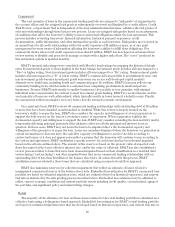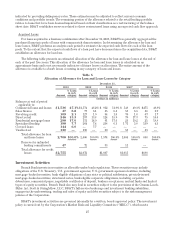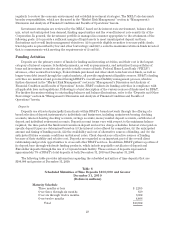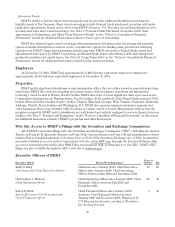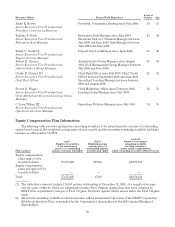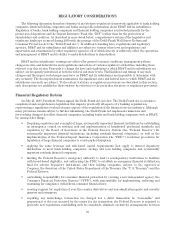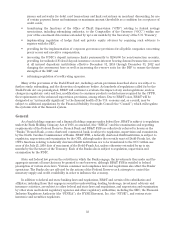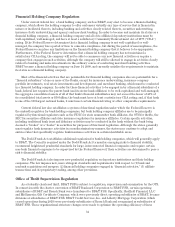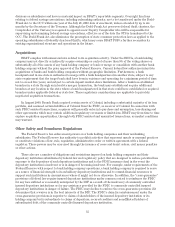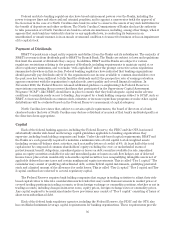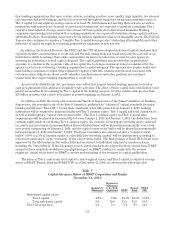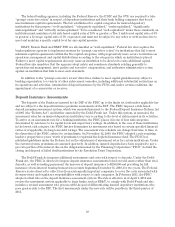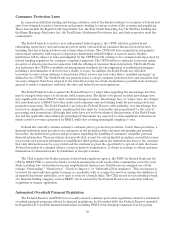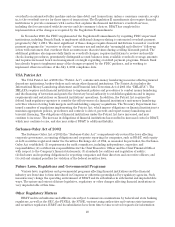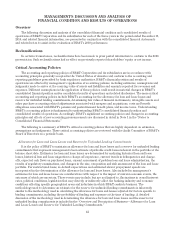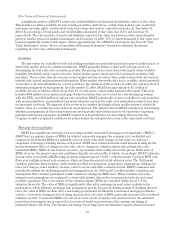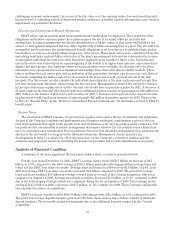BB&T 2010 Annual Report Download - page 35
Download and view the complete annual report
Please find page 35 of the 2010 BB&T annual report below. You can navigate through the pages in the report by either clicking on the pages listed below, or by using the keyword search tool below to find specific information within the annual report.divisions or subsidiaries and have no material impact on BB&T’s reportable segments. Oversight functions
relating to federal savings associations, including rulemaking authority, are to be transferred under the Dodd-
Frank Act to the OCC within one year of the July 21, 2010 date of enactment, unless extended by up to six
months by the Secretary of the Treasury. Although the Dodd-Frank Act preserves federal thrift charters, the
Comptroller of the Currency is required to appoint a new Deputy Comptroller who will be responsible for
supervising and examining federal savings associations, effective as of the date the OTS is transferred to the
OCC. The Dodd-Frank Act also eliminates the preemption of state consumer protection laws as applied to the
operating subsidiaries of federally chartered thrifts, which may cause BB&T FSB to further reconsider its
existing organizational structure and operations in the future.
Acquisitions
BB&T complies with numerous laws related to its acquisition activity. Under the BHCA, a bank holding
company may not directly or indirectly acquire ownership or control of more than 5% of the voting shares or
substantially all of the assets of any bank holding company or bank or merge or consolidate with another bank
holding company without the prior approval of the Federal Reserve. Current federal law authorizes interstate
acquisitions of banks and bank holding companies without geographic limitation. Furthermore, a bank
headquartered in one state is authorized to merge with a bank headquartered in another state, subject to any
state requirement that the target bank shall have been in existence and operating for a minimum period of time,
not to exceed five years; and subject to certain deposit market-share limitations. After a bank has established
branches in a state through an interstate merger transaction, the bank may establish and acquire additional
branches at any location in the state where a bank headquartered in that state could have established or acquired
branches under applicable federal or state law. These regulatory considerations are applicable to privately
negotiated acquisition transactions.
In August 2009, Branch Bank acquired certain assets of Colonial, including a substantial majority of its loan
portfolio, and assumed certain liabilities of Colonial from the FDIC, as receiver of Colonial. In connection with
such FDIC-assisted transactions, acquirers will generally enter into purchase and assumption, loss-sharing and
other agreements which may contain additional regulatory covenants or limitations. BB&T may from time to time
explore acquisition opportunities, through both FDIC-assisted and unassisted transactions, as market conditions
may warrant.
Other Safety and Soundness Regulations
The Federal Reserve has enforcement powers over bank holding companies and their nonbanking
subsidiaries. The Federal Reserve has authority to prohibit activities that represent unsafe or unsound practices
or constitute violations of law, rule, regulation, administrative order or written agreement with a federal
regulator. These powers may be exercised through the issuance of cease and desist orders, civil money penalties
or other actions.
There also are a number of obligations and restrictions imposed on bank holding companies and their
depository institution subsidiaries by federal law and regulatory policy that are designed to reduce potential loss
exposure to the depositors of such depository institutions and to the FDIC insurance fund in the event the
depository institution is insolvent or is in danger of becoming insolvent. For example, under requirements of the
Federal Reserve with respect to bank holding company operations, a bank holding company is required to serve
as a source of financial strength to its subsidiary depository institutions and to commit financial resources to
support such institutions in circumstances where it might not do so otherwise. In addition, the “cross-guarantee”
provisions of federal law require insured depository institutions under common control to reimburse the FDIC
for any loss suffered or reasonably anticipated by the DIF as a result of the insolvency of commonly controlled
insured depository institutions or for any assistance provided by the FDIC to commonly controlled insured
depository institutions in danger of failure. The FDIC may decline to enforce the cross-guarantee provision if it
determines that a waiver is in the best interests of the DIF. The FDIC’s claim for reimbursement under the
cross-guarantee provisions is superior to claims of shareholders of the insured depository institution or its
holding company but is subordinate to claims of depositors, secured creditors and nonaffiliated holders of
subordinated debt of the commonly controlled insured depository institution.
35



